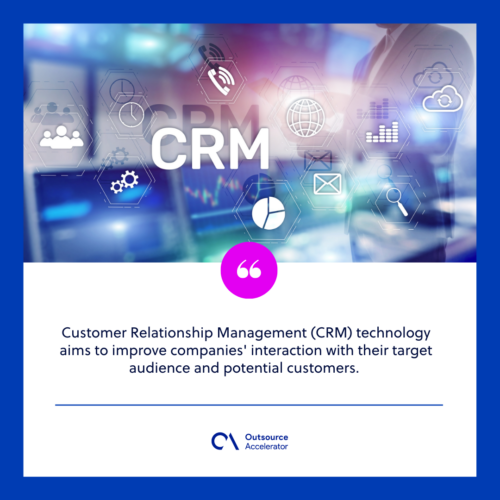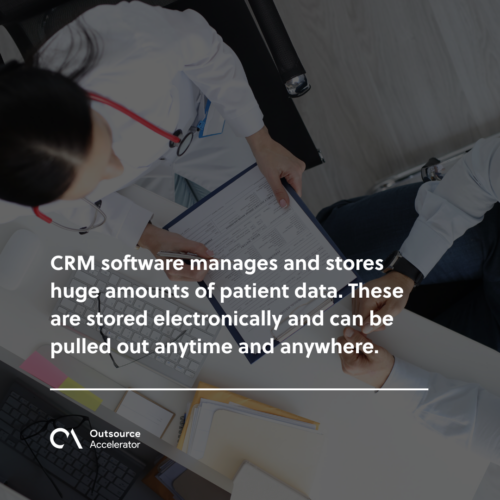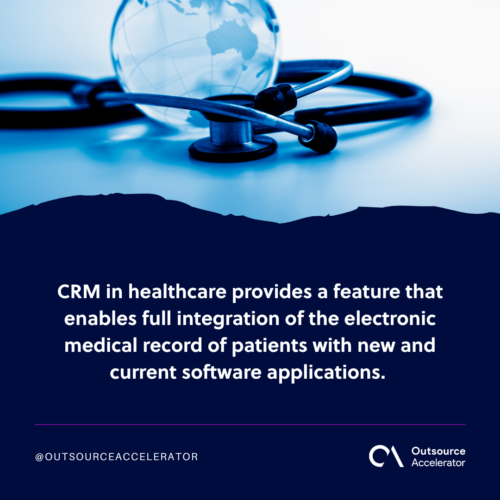Excellent healthcare customer service through CRM

Healthcare organizations constantly make an effort to provide the best care possible. They innovate and optimize current operational systems to address any inconsistencies.
However, hospitals are caught up with conventional techniques and systems despite driving better healthcare customer service. These often tend to be ineffective and incongruent with the increasing demand of patients.
Customers have become demanding and picky about the care they receive. They look for a personalized customer experience that caters to their needs as much as possible.
With the help of CRM systems, healthcare organizations can acquire tailor-fitted solutions based on the changing needs of patients.
This article will discuss how CRM software can augment healthcare customer service and help medical establishments achieve patient satisfaction.
What is CRM, and why does it matter to healthcare customer service?
Customer Relationship Management (CRM) technology aims to improve companies’ interaction with their target audience and potential customers.
In the medical industry, CRM aims to establish a better and more robust relationship between providers and patients.
This is achieved through automating their customer service processes, including sales and marketing initiatives.

3 uses of CRM
In general, customer relationship management software can be used in the following:
- Customer service processes – automation of services is integral to the actual delivery of care. This includes the swift processing of requests, medical history record keeping, and the strategic tracking of procedures rendered.
- Salesforce automation – is concerned with the fast and accurate processing of lab services, medical devices, pharmaceutical needs, and sales processing. This ensures that the finances of the facility are both on track.
- Marketing automation – focuses on branding and creating advertising initiatives to popularize the healthcare services offered.
The inclusion of CRM into healthcare customer service allows for the customization of care and treatment provided to patients.
Through automated calculation and forecasting, healthcare firms can better pinpoint the most appropriate treatment or care for the various needs of patients.
At the same time, CRM solutions allow for better visibility of a provider’s solutions to the community. It can promote unique services that it can offer to patients.
Five benefits of CRM in healthcare customer service
Below are the five common benefits of the integration of CRM in healthcare. These identified below have the biggest impact on the operations of hospitals and institutions:
Ease in documentation and reporting
CRM software manages and stores huge amounts of patient data. These are stored electronically and can be pulled out anytime and anywhere.
This has increased the efficiency of tracking patient appointments and interactions. Updates are given in real-time for any rescheduling and delays.
In terms of documentation, patient information can be updated, which provides a lot of time for staff to focus on other things besides getting patient information.
This empowers hospitals to offer more care and worry less about the accuracy and security of patient medical history and information.

Enhanced mailing and marketing campaigns
Healthcare CRM pools a lot of data and information about client feedback and contact details.
These two are crucial in creating a marketing strategy directed toward the needs of patients.
These solutions can be the subject of the email campaign, potentially improving the quality of care and the provider’s relationship with the patients. It will foster trust and a long-term commitment to the client’s well-being.
The great thing with CRM is that contacts can be filtered to get a more targeted list of clients, which will serve as a recipient of the campaigns and emails.
Multiple platforms integration
CRM in healthcare provides a feature that enables full integration of the electronic medical record of patients with new and current software applications.
In fact, CRM software is quite popular in different industries because of the ease of transferring and integrating information without compromising the integrity of the data.
In addition, CRM software can be accessed and used through a computer, smartphone, and even a tablet, making it quite versatile and easy to use around the hospital.
Better customer management
The healthcare industry has one of the busiest day-to-day operations. From filling out forms, creating reports, processing schedules, and ensuring compliance and regulations. These tasks are essential to ensure that quality care is provided and diagnoses are accurate.
The addition of CRM greatly improves the hospital’s internal operations, improving healthcare customer service.
Management of tasks is more efficient, avoiding redundancy. All staff and doctors have visibility of the progress of operations and the availability of everyone based on CRM tables.
With better internal operations, the patient wait time is greatly reduced, increasing satisfaction rates.
Stringent legal compliance and security of data
Usually, CRM software follows HIPAA standards and regulations in storing confidential patient data. Necessary encryptions are included while the network is secured and authenticated, avoiding cyber attacks.

Improving healthcare customer service through CRM
The CRM market revenue was expected to balloon to almost $69 billion last 2020. This was a drastic improvement from the $48.23 billion gained by the market in 2018.
Unquestionably, the automated solutions brought by CRM provide better, faster, and more efficient healthcare customer service.
It significantly reduces long patient wait times, account receivables in medical billing, and lapses in care delivery.
While acquiring a CRM solution can be quite expensive and daunting due to its technicalities, it can be a viable investment for healthcare organizations.
It might take a while before they can reap its benefits, but with gradual implementation, it will become easier to integrate into the system.







 Independent
Independent




